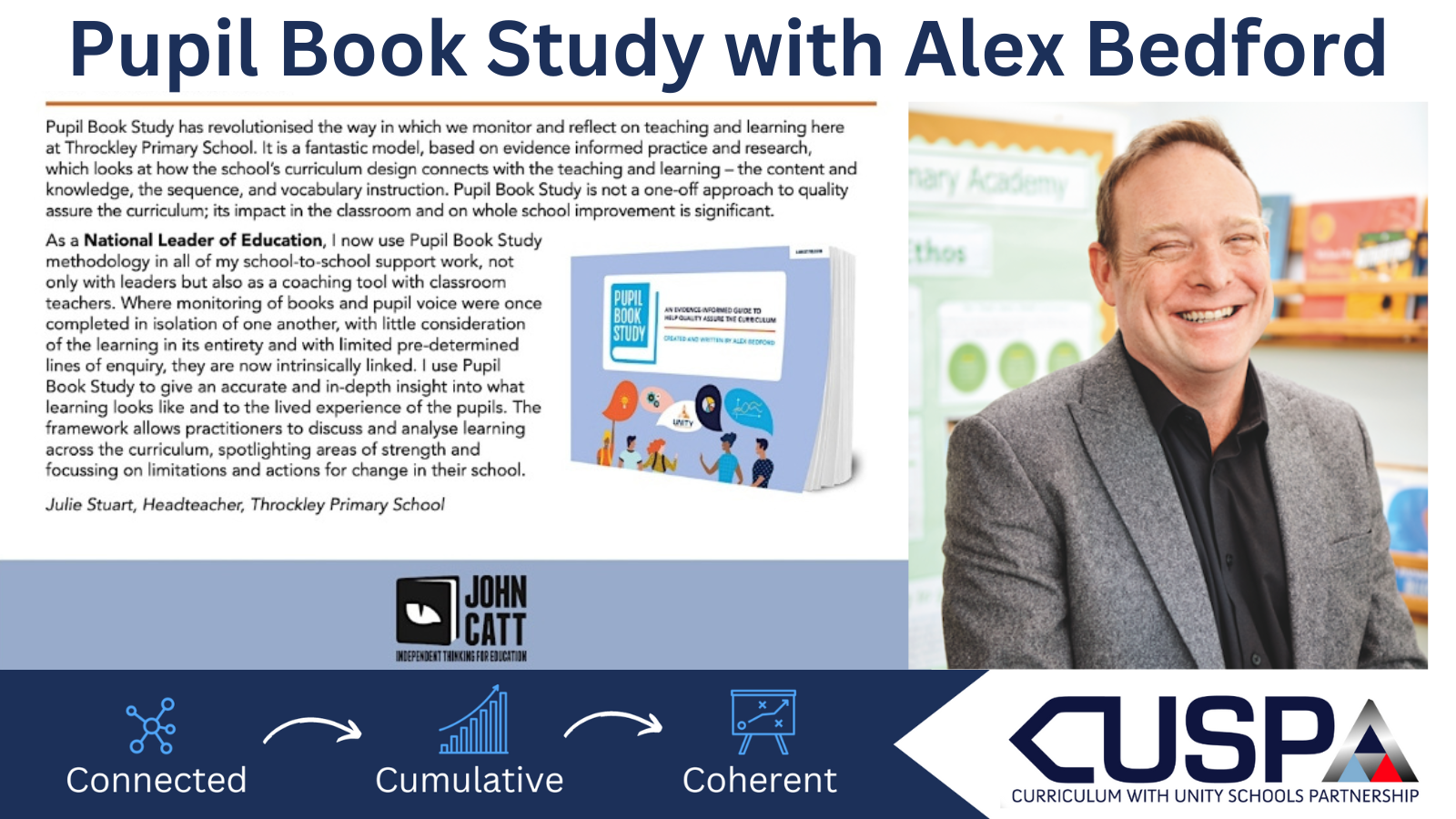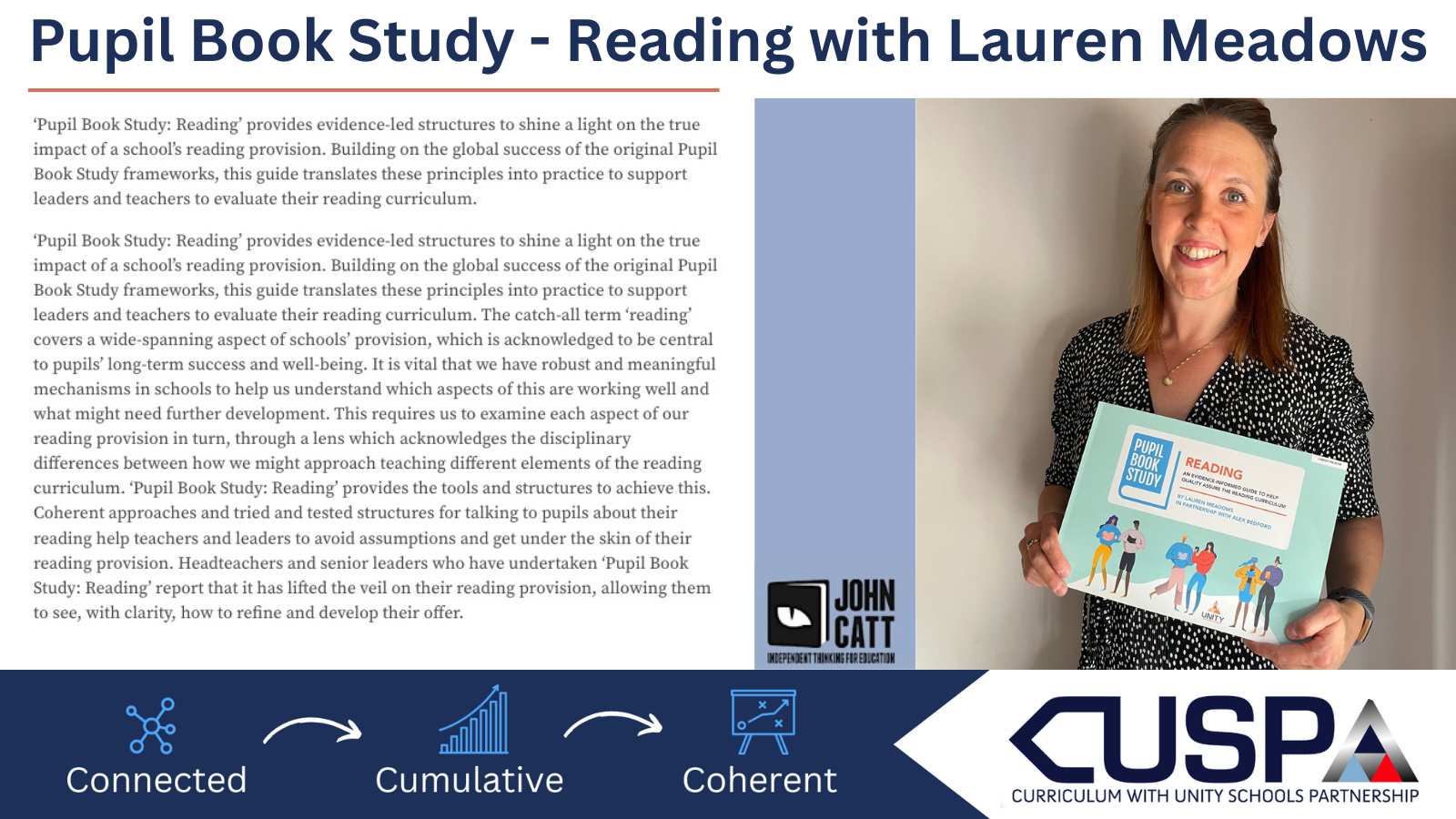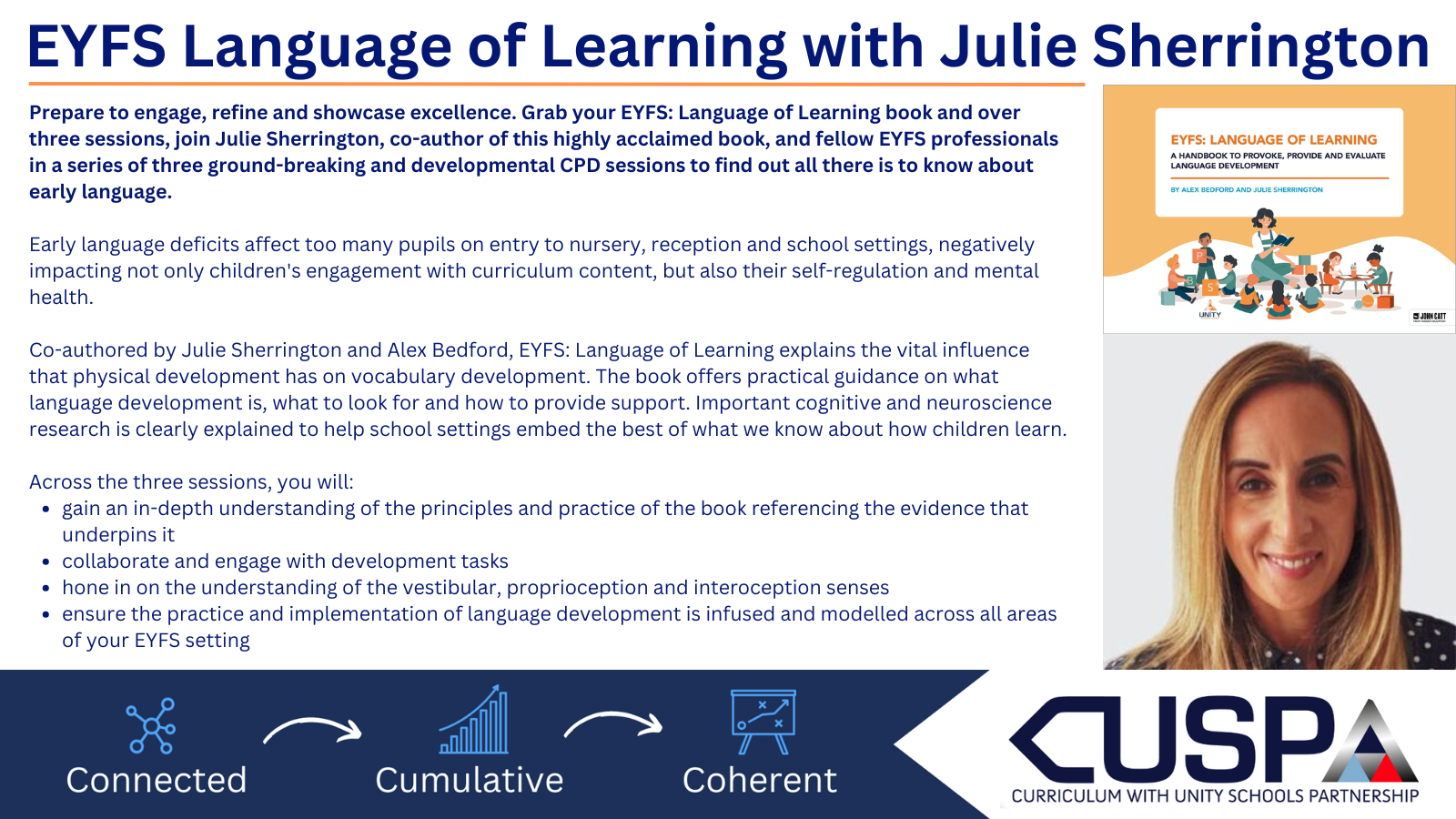Events


View past events
| 10th | Reading Subject Leader Session (recording library) |
| 16th | Early Foundations Subject Leader Session (recording library) |
| 17th | Writing Subject Leader Session (recording library) |
| 24th | Science Subject Leader Session (recording library) |
| 26th | Pupil Book Study with Alex Bedford Session 1/3 |
| 30th | Brambleside Primary Lead School Visit |
| 30th | History Subject Leader Session (recording library) |

View past events
| 2nd | Geography Subject Leader Session (recording library) |
| 3rd | Place Farm Primary Lead School Visit |
| 3rd | Pupil Book Study with Alex Bedford Session 2/3 |
| 8th | Alex Bedford speaking at CST Annual Conference |
| 8th | John Scurr Primary Lead School Visit |
| 8th | Art Subject Leader Session (recording library) |
| 10th | St Mary’s Catholic Primary Lead School Visit |
| 10th | DT Subject Leader Session (recording library) |
| 14th | Innovations Webinar (watch recording) |
| 15th | Music Subject Leader Session (recording library) |
| 17th | Pupil Book Study with Alex Bedford Session 3/3 |
| 17th | Acle St Edmund C of E Primary Lead School Visit |
| 18th | Shankhill C of E Primary Lead School Visit (Zoom) |
| 26th | Lauren Meadows speaking at researchED Milton Keynes |

View past events
| 7th | Language of Learning with Julie Sherrington Session 1/3 |
| 13th | CUSP Norfolk Engagement Event |
| 14th | French Subject Leader Session (recording library) |
| 15th | Print order deadline – spring term resources for pre-Christmas delivery |
| 21st | St Mary’s Catholic Primary Lead School Visit |
| 21st | Language of Learning with Julie Sherrington Session 2/3 |
| 25th | Houldsworth Valley Primary Lead School Visit |
| 26th | Computing Subject Leader Session (recording library) |
| 27th | Shankhill C of E Primary Lead School Visit |
| 28th | Spoken Word Festival |
| 28th | RE Subject Leader Session (recording library) |

View past events
| 3rd | Place Farm Primary Lead School Visit |
| 5th | Building Expressive Stores of Vocabulary Webinar |
| 5th | Language of Learning with Julie Sherrington Session 3/3 |

View past events
| 16th | Early Foundations Subject Leader Session (recording library) |
| 28th | Reading Subject Leader Session (recording library) |

View past events
| w/c 3rd | Art Festival |
| 4th | Writing Subject Leader Session (recording library) |

| 10th | Science Subject Leader Session (recording library) |
| 12th | Art Subject Leader Session (recording library) |
| 13th | History Subject Leader Session (recording library) |
| 17th | Geography Subject Leader Session (register on Sched) |
| 18th | Curious about CUSP? open webinar (join here at 9-10am) |
| 19th | CUSP Local Event (Essex) – Curriculum Excellence in a Changing National Landscape Email cusp@unitysp.co.uk to book |
| 19th | DT Subject Leader Session (register on Sched) |
| 24th | CUSP Q&A open session with Curriculum Implementation Adviser Claire Kilgour (join here 9-10am) |
| 25th | Music Subject Leader Session (register on Sched) |
| 31st | CUSP Q&A open session with Curriculum Implementation Adviser Claire Kilgour (join here 9-10am) |

| 1st | CUSP Local Event (Cumbria) – Curriculum Excellence in a Changing National Landscape Email cusp@unitysp.co.uk to book |
| 3rd | Lauren Meadows speaking at CST conference, Birmingham |
| 24th | Language of Learning with Julie Sherrington Session 1/3 |
| 24th | Pupil Book Study with Alex Bedford Session 1/3 (book on Sched) |
| 28th | RE Subject Leader Session (register on Sched) |
| 29th | French Subject Leader Session (register on Sched) |
| 30th | Pupil Book Study with Alex Bedford Session 2/3 (book on Sched) |

| 1st | Computing Subject Leader Session (register on Sched) |
| 8th | Language of Learning with Julie Sherrington Session 2/3 |
| 8th | Pupil Book Study with Alex Bedford Session 3/3 (book on Sched) |
| 22nd | Language of Learning with Julie Sherrington Session 3/3 |
About CUSP Events

Use evidence-led and structured conversations to quality assure the curriculum, teaching and learning.
Credited as influencing the Ofsted Deep Dive methodology, Pupil Book Study has reshaped national policy on how to best understand the endurance of learning.
Breathtakingly thorough, eminently sensible, purposeful and meaningful. Whatever you have been doing before, stop it and do this instead.
Clare Sealy
It became apparent to me throughout my years in education that the most obvious thing we don’t do as teachers is the very thing we should be doing more of – talking to pupils with their books. The question was how to do that without feeling overwhelmed, underprepared and wasting valuable time asking questions that lack structure and impact. This is how Pupil Book Study began, with the need for a systematic toolkit that enables leaders and teachers to focus on evaluating their curriculum, teaching and learning in a precise, evidence-rich environment.
It repositions how schools evaluate the quality of education and guides us to avoid the traps of making assumptions and, as Professor Rob Coe articulates so well, using weak proxies for learning that lack evidence and rigour. It aims to provide leaders and teachers with an insightful guide to talk with pupils and to study their work. Pupil Book Study helps schools deconstruct the working components of the curriculum, teaching and learning for its parts and aims to provide educators with a world-class evidence and research-focused route map towards excellence.
It illuminates strengths as well as focusing the user to possible limitations and traps to avoid.
The benefits of Pupil Book Study are realised professionally, academically and socially between staff and pupils. It serves as a manual that prioritises evidence to inform curriculum design, effective teaching methods and tasks that generate learning.
Alex Bedford, Curriculum Development Director (CUSP)
Alex and Lauren have modelled Pupil Book Study to Senior HMI and Policy makers at Ofsted as part of CUSP’s support to improve the quality of education and pupil engagement.
Read more about Pupil Book Study with Alex Bedford.





